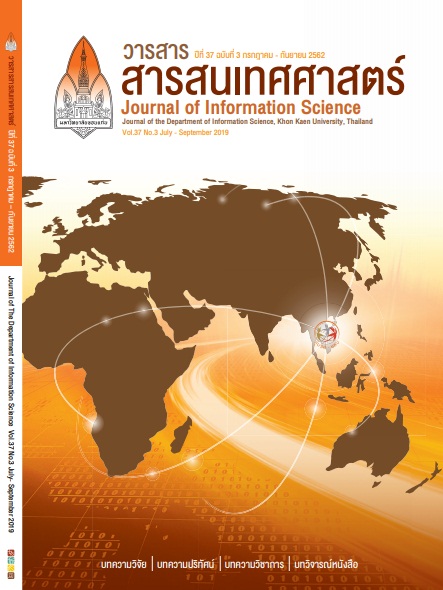Development of Ontology for the Knowledge of Heet-Sib-Song Custom
DOI:
https://doi.org/10.14456/jiskku.2020.10Keywords:
Ontology, Heet-sib-song, Linked Open DataAbstract
Purpose of the study: This research aims to organize a knowledge system and develop an ontology about the Heet-Sib-Song Custom in Northeastern of Thailand. By using Linked Open Data (LOD) in presenting the knowledge agent in the form of computer language.
Methodology: This research is R&D by using the Thesaurus concept to organize the knowledge system from content analysis and to create a set of knowledge structure about the Heet-Sib-Song Custom. The ontology concept is a tool for creating knowledge agents by using the HOZO Ontology Editor. Moreover, evaluating data links through the Linked Open Data system by experts.
Main Findings: Organizing the knowledge system about the Heet-Sib-Song Custom can used as a set of basic knowledge in creating ontologies. However, the structure is not very complicated. It is not suitable to apply to Semantic Web technology. Therefore, the test conducted using a linked open data system in order to explain the ontology more easily.
Applications of this study: The ontology is a structure that can used as a medium for explaining knowledge in other traditions, by converting the language structure to a RDF / XML file format. That using connect to open knowledge in other Linked Open Data.
Downloads
References
Brank, J., Grobelnik, M., & Mladenic, D. (2005). A survey of ontology evaluation techniques. In Proceedings of the Conference on Data Mining and Data Warehouse (SiKDD 2005). (166-170). Ljubljana: Slovenia.
Kosose, S. (1972). The study of Thai traditions and past Thai life. (In Thai). Phra Nakhon: Khlang Witthaya.
Likert, R. (1932). A Technique for the Measurement of Attitudes. New York: The Science Press.
Noy, N. F., & McGuinness, D. L. (2001). Ontology development 101: A guide to creating your first ontology. Retrieved 20 September 2014, from http://protege. Stanford. Edu/publications.
Phawijit, B. (2006). Thai traditions and beliefs. (In Thai). Bangkok: Odeon Sound.
Pinthong, P. (1997). Northeastern Thai tradition. (In Thai). Ubon Ratchathani:Siritham Offset.
Prakarncharoen, S. (2014). Ontology: the choice of knowledge base development in content form. (In Thai). Bangkok: Faculty of Applied Science King Mongkut’s University of Technology North Bangkok.
Punnotok, T. (2004). Northeastern literature. (In Thai). Bangkok: Ramkhamhaeng University Press.
Thamwat, J. (1995). Northeast folklore. (In Thai). Bangkok: Aksorn Wattana.
UNESCO. (2020). Social practices, rituals and festive events. Retrieved 20 September 2014, from https://ich.unesco.org/en/social-practices-ritualsand-00055








